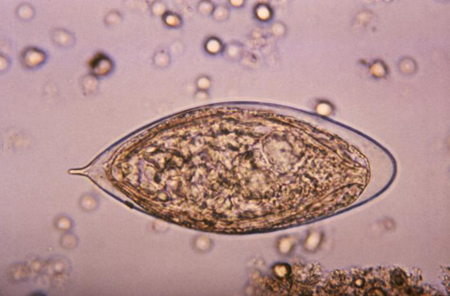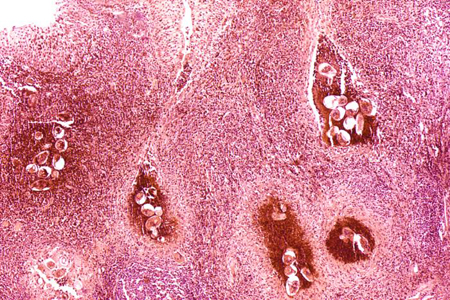Investigations
1st investigations to order
stool or urine microscopy
Test
Also allows quantification of egg burden and Schistosoma species identification.
This is the most specific test, but often multiple samples are required to establish diagnosis in low-level infections, as eggs can be passed intermittently.[44][45]
Concentrating techniques may increase yield from stool and urine specimens.[44]
Species identification is based on egg morphology. S haematobium eggs are spindle-shaped with a terminal spine, and S mansoni eggs have a characteristic lateral spine. S japonicum eggs are typically smaller and oval-shaped.[57]
Collecting S haematobium eggs from urine is recommended between noon and 3 p.m.[Figure caption and citation for the preceding image starts]: Micrograph depicting an egg from a Schistosoma haematobium trematode parasite; magnified 500xCDC; used with permission [Citation ends].
Result
visualisation of eggs
urinalysis
Test
Haematuria is associated with both acute and chronic disease (approximately 50% of cases) through ulceration of genitourinary epithelium.
Secondary bacterial infection can occur with acquired urinary tract anatomical abnormalities.
Result
haemoglobin detection, trace to moderate proteinuria, bacteria
full blood count
Test
Eosinophilia is often present (>90% of cases) during acute infections.[38]
However, eosinophilia may be absent if chronic infection has persisted for years.
Result
normocytic, normochromic mild anaemia often present; eosinophilia, occasionally thrombocytopenia
blood culture
Test
Routinely performed in patients with fever. Should be negative if schistosomiasis is the only source of fever.
Result
negative
thick and thin blood smears
Test
Routinely performed in patients with fever who are recently returned travellers from endemic malaria areas. Should be negative if schistosomiasis is the only source of fever.
Result
negative
Investigations to consider
serology
Test
Species-specific ELISA tests are available from the CDC or commercial labs.[28][46]
Serology is >98% sensitive.[46]
May be useful in recent infection before egg elimination has begun, or in cases where egg detection is negative but clinical suspicion of active infection remains very high. May take several weeks to become positive after initial infection.[57]
Positive results do not differentiate between past or current (active) infection and neither can it indicate current burden.
Serology should not be used to monitor therapeutic response.
Result
antibodies against parasite antigens
liver function tests (LFTs)
Test
Hepatocellular dysfunction is rare in schistosomiasis.
Abnormal LFTs may indicate concurrent disease due to viral or toxic hepatitis.
Result
normal, except in end-stage liver disease
renal function tests
Test
Abnormalities in urea and creatinine or in 24-hour creatinine clearance suggest immune-mediated glomerulonephritis (Schistosoma mansoni and S haematobium) or obstructive uropathy (S haematobium) due to end-stage renal disease.[63][64]
Result
normal, except in immune-mediated glomerulonephritis or obstructive uropathy
abdominal ultrasound
Test
Characteristic changes may be observed in bladder and kidneys (Schistosoma haematobium) or in the portal veins and liver parenchyma (S mansoni and S japonicum).[62]
These positive results combined with a history of exposure to endemic areas strongly favour a diagnosis of schistosomiasis.
Result
granulomas or wall thickening of the bladder, hydroureter or hydronephrosis, periportal hepatic fibrosis or hepatosplenomegaly can be seen, especially in the chronic stage
tissue biopsy
Test
Tissue biopsy (rectal, liver, bladder, or cervical) can confirm diagnosis.
These tests are particularly useful if urine or stool examinations are negative.
Differential diagnoses such as inflammatory bowel disease can also be evaluated using this method.[Figure caption and citation for the preceding image starts]: Histopathology of schistosomiasis caused by Schistosoma haematobia (bladder)CDC, Dr Edwin P. Ewing, Jr; used with permission [Citation ends].
Result
granulomas surrounding eggs in affected tissue
computed tomography (CT) or magnetic resonance imaging (MRI) abdomen
MRI brain and spinal cord
Test
Indicated for neurological symptoms.[49]
Result
evidence of inflammation or granulomas
chest x-ray
Test
Indicated for evaluation of patients with respiratory symptoms.
Result
small pulmonary nodules in acute disease; attenuated peripheral vascular markings and enlarged pulmonary artery shadows suggests pulmonary hypertension
CT chest
Test
Indicated for evaluation of patients with respiratory symptoms.
Progressive obliteration of pulmonary arterioles and capillaries occurs and leads to secondary fibrotic changes in the lung parenchyma, often over decades.
Result
small pulmonary nodules in acute disease; attenuated peripheral vascular markings and parenchymal fibrosis in chronic disease
urinary circulating anodic antigen (CAA)
Test
A point of care test for screening in endemic areas where there is not adequate access to microscopy. Has good sensitivity; however, specificity is controversial as a good number of individuals have positive tests in the absence of positive microscopy. This may be because it is more sensitive than microscopy.[47][48]
Result
positive (in urinary schistosomiasis)
schistosome DNA/RNA
Test
A number of tests designed to detect schistosome DNA or RNA have been developed to complement parasitological and serological diagnosis with high reported accuracy. The availability of these tests varies depending on location. Tests can be run on serum, faeces, CSF, or urine.[47]
Result
positive
Use of this content is subject to our disclaimer